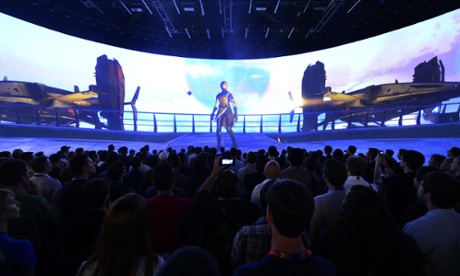
When you’re involved in video games, whether because you work with them, write about them or are a passionate fan, you end up gathering an arsenal of sorts: Words about why video games are good for people. This is not your fault, but rather a learned response to decades of games’ scapegoating as the cause of all modern moral panic. You always feel like you have to defend games even before an argument has been levied.
You learn to talk about how playing games can be a good outlet for stress, a pleasing theoretical space for you to experiment with identity and consequences, or a cutting-edge stage for you to do improvisational performance with other people. Those are all valid things to say.
There is one of them that makes me feel a little bit disingenuous, though. It’s “games are social” and “they’re just another way to play with your friends”.
“Social” is as big a thing in video games as it is anywhere else in tech and digital media. Social media, apps and games are supposed provide tech-enabled ways for us to increase our number of interactions with one another and our sense of community, in a world full of information overload and diminishing returns. Video games are, theoretically, just like your weekend kickball team or your Wednesday night book club.
Multiplayer online games are supposed to be about the player first and foremost; there is, developers say, “emergent storytelling” derived from the experiences players have in game fictions that is richer and more meaningful than any linear narrative an author could design. Like that time you and your friends were doing a mission together and this happened and then that happened and it was so awesome and then supposedly you’re still talking about it years later. That kind of thing.
On a practical level, though, “social” is a business model. It means content engineered to be “liked” or shared. It means fundamentally we spend anxious time doing free labour for social infrastructures, providing our personal lives, disseminating links, making those platform-holders wealthy with our exhibitionism and interaction. When it comes to games, it’s increasingly on the player to create the meaning in their experience.
And passionate players provide unpaid labor to games development, too: games are being released in beta and updated in public, so that the end product will better meet their needs. Thus the eager frontline beta testers mitigate the expensive risk of developing a commercial tech product, just through the fuel of their social behavior.
In science fiction and fantasy media, virtual realms have long been portrayed as spaces of limitless possibility, where people can be pure versions of themselves, free of the constraints of the real world, and where their dearest urges can be safely expressed and ratified. But it just doesn’t shake down like that in modern games, where people would much rather use an established vocabulary, would much rather emulate the constraints of the real.
I watched a colleague of mine play through the beta of Bungie’s latest game, Destiny. It has all the beauty and heft of a massive, futuristic space opera, it has a gorgeous user interface, and it will be a high-end online game where friends can do missions together forever. It is a genius way to do business: create a game where the mode of participation is endless investment. As Destiny is a cutting-edge product you feel almost peer-pressured to participate.
It is social in that business sense: you must collaborate with and keep up with your friends, ensure that your statistics and equipment – your fitness for competition – are ever increasing. You participate excitedly in this capitalistic metaphor.
Yet are people really playing “together”? I sat by while my friend and his friend chased their avatars around a surreal galactic arena, co-ordinating themselves with no small amount of frustration over a headset. Their allies, useless strangers with garbled character sets for names, trooped around in the background, mucking things up. My friends had found their teammates in a weird sort of central plaza area where fellow players performed sinuous dance animations at each other, their avatars mashing together in a frustrated urge for connection.
I had the distinct thought that any sort of social behavior, “emergent” or otherwise, was occurring in spite of the impressive infrastructure, not thanks to it. The writer Jenn Frank, an avid player of video games, has analysed the complicated resentment she felt toward Destiny, a game world that is always on, that has no “pause” feature, where some stranger is always counting on you to some extent. She disliked seeing her fiance not quite able to disengage when real life came calling. Though the couple shared video games together as a hobby, this particular massive “social” universe showed its potential to create a wedge.
I believe in the potential for games to create incredible collaborative environments for play. But let’s think about what a “social” play experience would look like if it served us, the users, and not the platform, whose only real desire is to have us use it, to have us serve and propagate it, to lend hours of our time to its cold lunar ecosystem.

